 |
Does everyone have food? If not, why not?
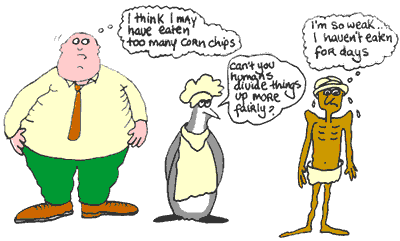 Sadly
no. Nearly 1 billion people on our planet — three
times more people than live in the United States
— are constantly short of food or near starving.
This seems doubly wrong when you think that
almost the same number have so much food they
get to be overweight and even obese. Couldn’t
humans divide things up a little more fairly? Sadly
no. Nearly 1 billion people on our planet — three
times more people than live in the United States
— are constantly short of food or near starving.
This seems doubly wrong when you think that
almost the same number have so much food they
get to be overweight and even obese. Couldn’t
humans divide things up a little more fairly? 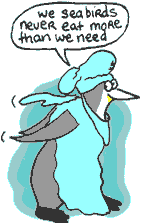 We
seabirds never eat more than we need. You know
why? We can’t afford to get fat! Can you
imagine a fat penguin trying to catch a fish?
We have to stay sleek and healthy. Humans can
get fat and it doesn’t matter (though they
might be quite unhappy about it) because they
don’t have to hunt their food. They can
just get into their cars and drive to the supermarket
or takeaway when they feel hungry. We
seabirds never eat more than we need. You know
why? We can’t afford to get fat! Can you
imagine a fat penguin trying to catch a fish?
We have to stay sleek and healthy. Humans can
get fat and it doesn’t matter (though they
might be quite unhappy about it) because they
don’t have to hunt their food. They can
just get into their cars and drive to the supermarket
or takeaway when they feel hungry.
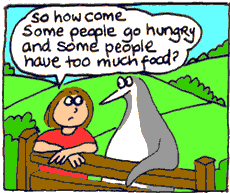 That
other billion people — the hungry and starving
ones — can’t get enough food to eat
because they are so poor. They can’t afford
to buy food —
or can only afford the very cheapest, low quality
stuff no one else wants. That
other billion people — the hungry and starving
ones — can’t get enough food to eat
because they are so poor. They can’t afford
to buy food —
or can only afford the very cheapest, low quality
stuff no one else wants. 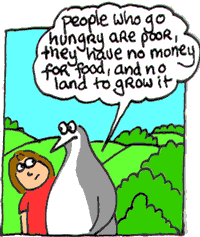 If
they each had a little piece of land, they could
grow their own. But they don’t because most
of them live in slums. They can’t get jobs because there
are none, so often they have to beg, steal or
scavenge the garbage from richer neighbourhoods. If
they each had a little piece of land, they could
grow their own. But they don’t because most
of them live in slums. They can’t get jobs because there
are none, so often they have to beg, steal or
scavenge the garbage from richer neighbourhoods.
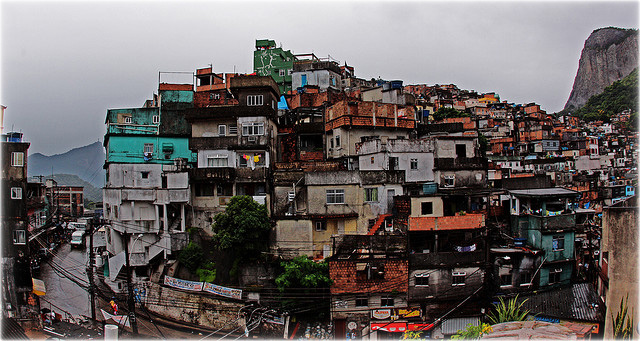
Called favelas in Portuguese-speaking Brazil; pueblos
jovenes) in other Spanish-speaking Latin American countries.
What
a miserable life.
 The elephant in the room The elephant in the room
Sometimes when there's a problem
(represented by the elephant) so huge, people
just pretend it's not there. One of the biggest
problems of all is the rapidly increasing
number of humans on the planet. How will
all these people get to eat? Check
out this
video — a voyage through time since
humans first appeared on planet Earth about
200,000 years ago. Look what happens when
farming got going 10,000 years ago...
|



